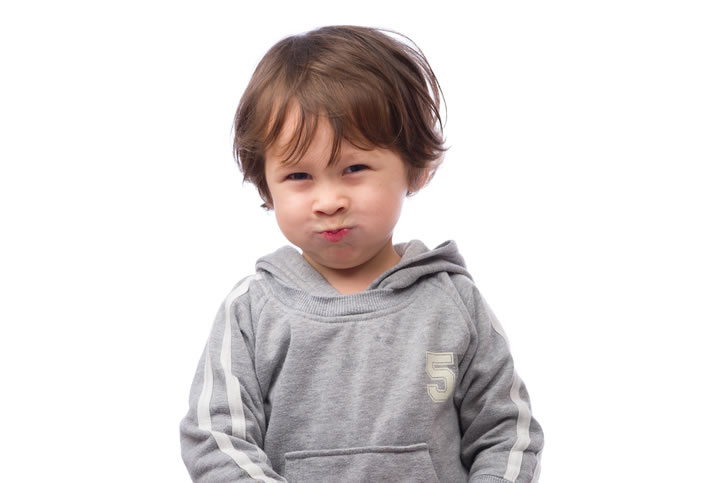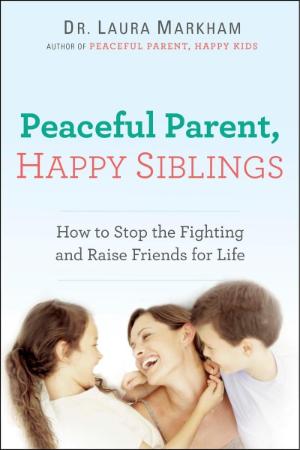
In a recent post, I described how to intervene when a preschooler is aggressive toward a younger sibling. But sometimes it's the younger child, often a toddler, who initiates the brawling. Toddlers don't have a fully developed prefrontal cortex, so their emotions routinely overcome their knowledge that "hitting hurts." And often they can't express themselves very well verbally, so they're easily frustrated. So they lash out.
But your older child deserves to feel safe in her own house, so you can't just sit by and "let them work it out." Obviously, you immediately get between your children to stop the hitting. You say "Ouch! No hitting! Hitting hurts!" But what if the aggression continues?
As always, if you want to change your child's behavior, get curious about the feelings and needs driving that behavior, and address them. For instance:
1. The toddler wants to connect with the older sibling.
Clumsy, yes, but he's a toddler. He wants his big sister's attention. Why not crash into her, or into that project she's so painstakingly concentrating on? She'll certainly notice!
Solution: Teach the toddler how to initiate a more positive interaction. Say "Ouch! No hurting your sister! Are you trying to get your sister's attention? Use your words! Say 'Tara, here I am! Play with me!'"
Of course, it isn't the older child's responsibility to play with the younger child. Sometimes, she won't want to. So you'll have to give her a safe place to work on her projects without toddler "help." Coach her on how to deflect the toddler gracefully by saying "Yes, I see you! Do you want to play with this spaceship? It goes Vroom!" But don't leave her to fend off the toddler by herself. Be available when she needs you to run interference, and offer your toddler some connection with you instead.
2. The toddler wants what the older sibling has.
Solution: Teach basic social skills.
Say to the toddler "Ouch! No hitting! It looks like you want the giraffe your brother is playing with? You can ask him for a turn. Say 'Turn, please!'" Siblings won't always want to give a turn right away, and you will probably have to "help" the toddler wait quite often. But explain to your other children that if they can give the toddler a turn when she asks, she's more likely to use her words instead of her fists, so when they don't need the giraffe at that moment, it's helpful to let the toddler use it for a bit. (For more on sharing.)
3. The toddler is retaliating for the older sibling's teasing or more subtle aggression, such as grabbing toys or making mean faces.
Solution: Set clear limits that physical hurting is never okay; also set limits on teasing and other provocations.
Put an arm around each child and say "I see two upset people here...you are having a hard time, aren't you? (Modeling taking responsibility) I'm so sorry I wasn't here to help you both....Can you tell me about it?.... I see.
To the older child: "Your brother (the toddler) scratched you. Ouch... That hurts... I'm so sorry."
To the toddler: "Scratching hurts! Ouch! No scratching... Were you mad at your brother? Use your words... Say 'I'm MAD!' Can you say that right now? Yes, you're mad! Tell us in words, or stomp your foot, like this! And no scratching, right? No scratching!"
Then, to the older child: "Making faces like that can really hurt someone's feelings and make them feel so mad they want to hurt. If you're upset at your sibling, tell them what you need, instead of provoking them."
4. The toddler is unhappy and is taking it out on her sibling.
Solution: If your toddler often seems unhappy and angry, she needs your help. Toddlers have strong feelings, but they generally have sunny personalities.
Maybe there's something physically wrong that you can pinpoint with a little detective work. Or maybe your toddler is super-sensitive and has some tears and fears stored up that need to come out. Make sure you're using preventive maintenance (empathy, connection, laughter and emotion coaching -- here's a whole article on how) to help your toddler with their big feelings, so they don't get so irritable.
5. The toddler is jealous of the parent's interactions with the older sibling.
Solution: If you suspect that your toddler is jealous of your relationship with an older sibling, focus on connecting more with the toddler.
Every child needs daily one on one time with each parent, without siblings around. Find time every day for just the two of you to be close. Initiate lots of playful physical roughhousing that gets your toddler laughing, and gets the oxytocin (the bonding hormone) flowing. Before you engage with your older child, for instance to help with homework, focus on the toddler for five minutes, filling his love tank and getting him busy with a toy or activity.
6. The toddler just wants to be heard.
Sometimes toddlers lash out physically because they don't know how else to get their point across.
Solution: Teach your toddler words to stick up for himself. Practice words like "Stop!" and "Move please!" with your toddler, making it a fun game, to ensure that she doesn't have to hit to be heard.
And, of course, you can't be there every minute. How can you teach your older child how to relate constructively to an aggressive toddler? That's our next post: Coaching Big Sibs To Handle the Younger Child's Aggression.
In the meantime, if your "toddler climbs on the five year old's back like a monkey and won't get off," maybe it's time to teach your older child some bucking bronco moves. Just make sure they know that wild horses only buck their riders onto the couch.






